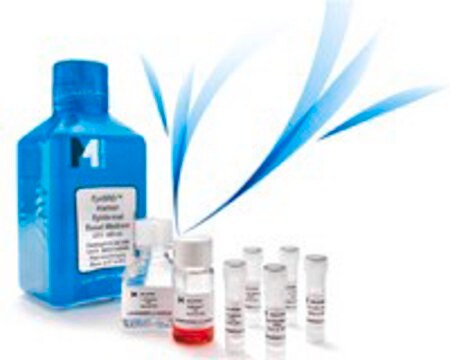HTS142RTA
Ready-to-Assay EP4 Prostanoid Receptor Frozen Cells
Human
Sign Into View Organizational & Contract Pricing
All Photos(1)
About This Item
UNSPSC Code:
41106514
eCl@ss:
32011203
NACRES:
NA.84
Recommended Products
Product Name
Ready-to-Assay EP4 Prostanoid Receptor Frozen Cells, Human EP4 GPCR frozen cells for Calcium Flux FLIPR Assays.
biological source
human
Quality Level
manufacturer/tradename
Ready-to-Assay
technique(s)
calcium flux assay: suitable
NCBI accession no.
detection method
fluorometric
shipped in
dry ice
General description
Millipore’s Ready-to-Assay GPCR frozen cells are designed for simple, rapid calcium assays with no requirement for intensive cell culturing. Millipore has optimized the freezing conditions to provide cells with high viability and functionality post-thaw. The user simply thaws the cells and resuspends them in media, dispenses cell suspension into assay plates and, following over night recovery, assays for calcium response.
Prostanoids are a series of arachidonic acid metabolites produced by the action of cyclooxygenase and further modified by isomerases and synthases. Cells rapidly secrete prostanoids after synthesis, whereupon the prostanoids bind to a family of 8 GPCRs to exert their biological effects (Narumiya and FitzGerald, 2001). The prostaglandin PGE2 causes pain, vasodilation, immunosuppression of T cells, bone remodeling and promotion of carcinogenesis. Four related GPCRs, EP1, EP2, EP3 and EP4, each bind to PGE2, but the different G protein coupling status of each receptor leads to distinct biological effects. EP4 couples primarily to Gs to increase intracellular cAMP levels. During neonatal development, EP4 participates in closure of the ductus arteriosus, a process required for switching circulation from the placenta to the lungs (Nguyen et al., 1997). In addition, EP4 mediates PGE2-induced bone formation by promoting osteoblastogenesis, and selective EP4 agonists are being evaluated as potential treatments for osteoporosis (Yoshida et al., 2002). Millipore’s cloned human EP4-expressing cells are made in the Chem-1 host, which supports high levels of recombinant EP4 expression on the cell surface and contains high levels of the promiscuous G protein G15 to couple the receptor to the calcium signaling pathway. Thus, the cell line is an ideal tool for screening for agonists and antagonists at EP4.
Prostanoids are a series of arachidonic acid metabolites produced by the action of cyclooxygenase and further modified by isomerases and synthases. Cells rapidly secrete prostanoids after synthesis, whereupon the prostanoids bind to a family of 8 GPCRs to exert their biological effects (Narumiya and FitzGerald, 2001). The prostaglandin PGE2 causes pain, vasodilation, immunosuppression of T cells, bone remodeling and promotion of carcinogenesis. Four related GPCRs, EP1, EP2, EP3 and EP4, each bind to PGE2, but the different G protein coupling status of each receptor leads to distinct biological effects. EP4 couples primarily to Gs to increase intracellular cAMP levels. During neonatal development, EP4 participates in closure of the ductus arteriosus, a process required for switching circulation from the placenta to the lungs (Nguyen et al., 1997). In addition, EP4 mediates PGE2-induced bone formation by promoting osteoblastogenesis, and selective EP4 agonists are being evaluated as potential treatments for osteoporosis (Yoshida et al., 2002). Millipore’s cloned human EP4-expressing cells are made in the Chem-1 host, which supports high levels of recombinant EP4 expression on the cell surface and contains high levels of the promiscuous G protein G15 to couple the receptor to the calcium signaling pathway. Thus, the cell line is an ideal tool for screening for agonists and antagonists at EP4.
Cell Line Description
GPCR Cell Lines
Host cells: Chem-1
Application
Human EP4 GPCR frozen cells for Calcium Flux FLIPR Assays.
Biochem/physiol Actions
GPCR Class: A
Protein Target: EP4
Target Sub-Family: Prostanoid
Components
Pack contains 2 vials of mycoplasma-free cells, 1 ml per vial.
Fifty (50) mL of Media Component.
Fifty (50) mL of Media Component.
Storage Class Code
10 - Combustible liquids
WGK
WGK 1
Flash Point(F)
Not applicable
Flash Point(C)
Not applicable
Certificates of Analysis (COA)
Search for Certificates of Analysis (COA) by entering the products Lot/Batch Number. Lot and Batch Numbers can be found on a product’s label following the words ‘Lot’ or ‘Batch’.
Already Own This Product?
Find documentation for the products that you have recently purchased in the Document Library.
Our team of scientists has experience in all areas of research including Life Science, Material Science, Chemical Synthesis, Chromatography, Analytical and many others.
Contact Technical Service






